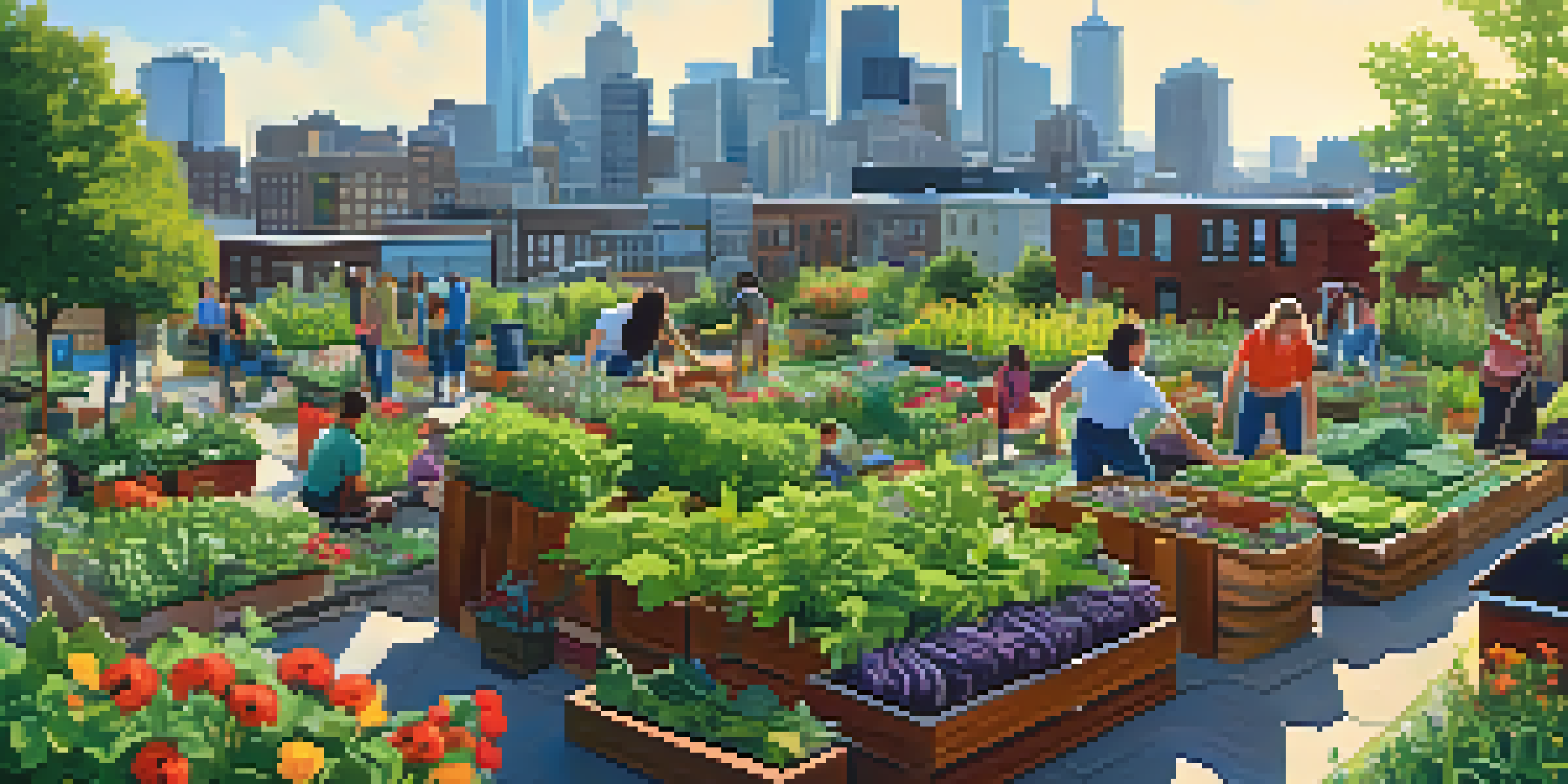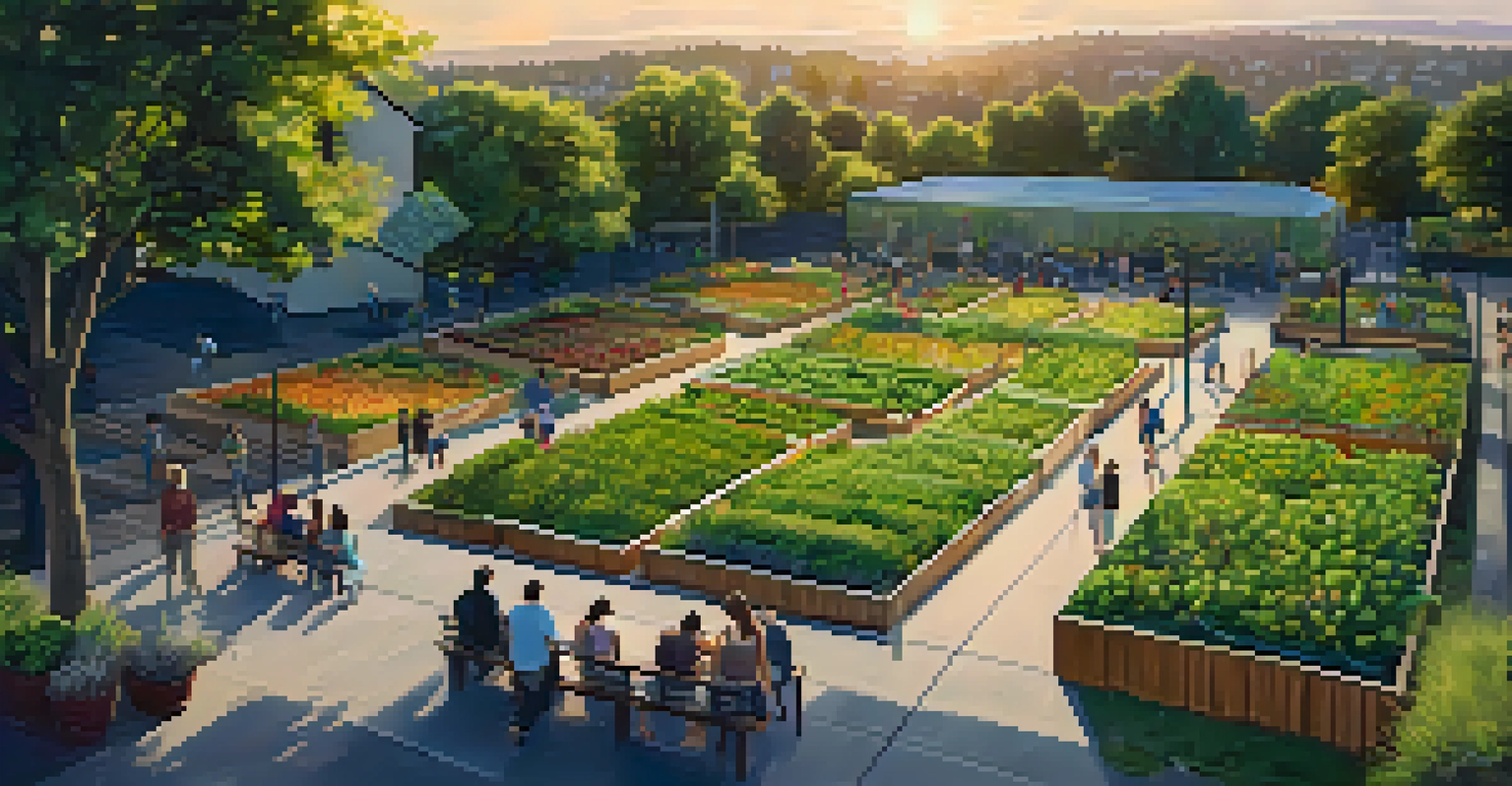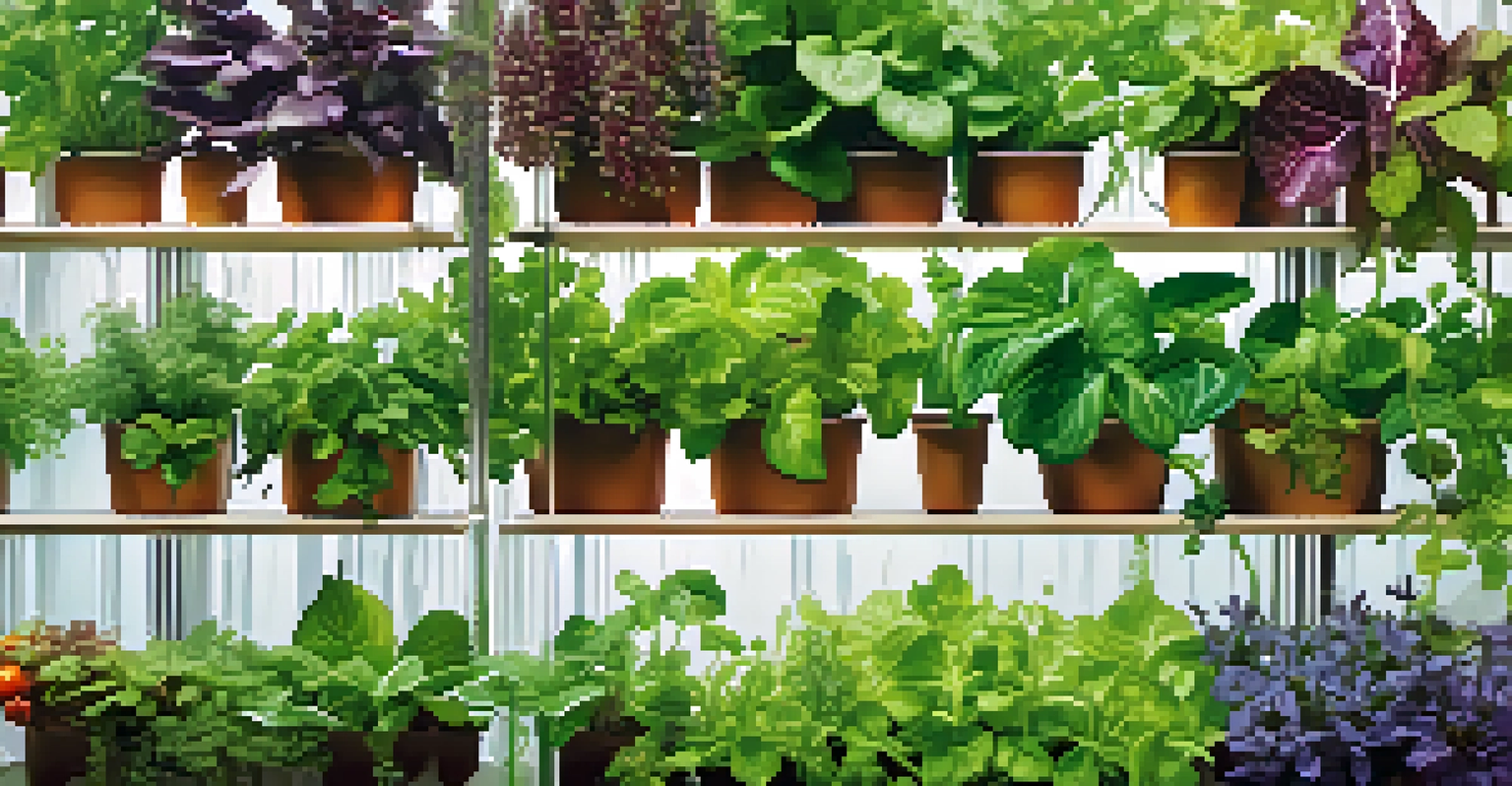Urban Agriculture in Seattle: A Step Towards Sustainability

The Rise of Urban Agriculture in Seattle
Urban agriculture has been gaining traction in Seattle, transforming cityscapes into green spaces filled with community gardens and farms. This movement is driven by a growing awareness of food sustainability and the benefits of locally sourced produce. With limited space in urban settings, Seattleites are creatively utilizing rooftops, vacant lots, and even sidewalks to cultivate fresh vegetables and fruits.
Urban agriculture is not just about growing food; it's about growing community.
The city has seen an increase in community-supported agriculture (CSA) programs, allowing residents to subscribe to regular deliveries of fresh produce. These initiatives not only provide healthy food options but also help foster a sense of community among participants. By participating in urban agriculture, individuals are taking an active role in their food systems, which encourages a deeper connection to what they eat.
Additionally, local organizations and city policies are supporting these urban farming efforts, with initiatives that promote sustainable practices. Through grants and educational programs, Seattle is ensuring that more residents can engage in agriculture, leading to a greener and more sustainable urban environment.
Benefits of Urban Agriculture for Communities
Urban agriculture offers numerous benefits that extend beyond just food production. One of the most significant advantages is the improvement of food security, especially in neighborhoods that lack access to fresh produce. By growing food locally, communities can reduce their reliance on grocery stores and ensure that everyone has access to nutritious options.

Moreover, urban farms often serve as educational hubs, teaching residents about sustainable practices and healthy eating. Workshops, school programs, and volunteer opportunities help cultivate a culture of learning and sharing within the community. This not only empowers individuals but also strengthens social bonds, as people come together to work towards a common goal.
Urban Agriculture Boosts Community
Urban farming initiatives in Seattle enhance food security, foster community connections, and promote sustainable practices.
Another key benefit is the positive impact on the environment. Urban agriculture contributes to biodiversity, improves air quality, and helps manage stormwater runoff. By integrating green spaces into urban areas, these farms also create habitats for various species, promoting ecological balance and enhancing the beauty of the city.
Sustainable Practices in Urban Farming
Sustainability is at the heart of urban agriculture practices in Seattle. Many urban farmers prioritize organic methods, avoiding harmful pesticides and fertilizers that can damage the environment. Instead, they rely on composting, crop rotation, and companion planting, which enrich the soil and promote healthy plant growth.
The future will be about making the best use of urban space to feed our cities.
Water conservation is another critical aspect of sustainable urban farming. Techniques such as drip irrigation and rainwater harvesting help minimize water usage while ensuring that crops receive adequate moisture. By implementing these practices, urban farmers can contribute to the overall sustainability of the city and its resources.
Additionally, many Seattle urban farms are exploring innovative technologies like vertical farming and hydroponics. These methods allow for efficient use of space and resources, enabling farmers to grow more food in smaller areas. By embracing these advancements, urban agriculture in Seattle is paving the way for a more sustainable future.
Challenges Facing Urban Farmers in Seattle
Despite the many benefits, urban farmers in Seattle face their share of challenges. One significant hurdle is the competition for land, as urban spaces are often in high demand for housing and commercial development. This can make it difficult for farmers to secure long-term leases or access suitable plots for farming.
Additionally, urban farmers often struggle with funding and financial sustainability. Many rely on grants and donations, which can be inconsistent and unpredictable. This financial uncertainty can make it challenging to invest in necessary infrastructure and resources to expand their operations.
Challenges for Urban Farmers Persist
Despite the benefits, urban farmers face challenges such as land competition, financial sustainability, and complex regulations.
Moreover, navigating city regulations and zoning laws can be complex for urban farmers. While there are supportive policies in place, understanding the legal requirements can be daunting. Farmers must often advocate for more favorable regulations to ensure their operations can thrive in the urban landscape.
Community Involvement in Urban Agriculture
Community involvement is crucial for the success of urban agriculture in Seattle. Local residents are often the driving force behind community gardens and urban farms, bringing their skills and enthusiasm to the table. These collaborative efforts help build a sense of ownership and pride in their neighborhoods, fostering a spirit of cooperation.
Volunteering at local farms not only provides hands-on experience but also opens up opportunities for learning and networking. Many urban farms host regular events, workshops, and volunteer days, encouraging community members to participate actively. This engagement helps create a vibrant community focused on sustainability and healthy living.
Moreover, local businesses often partner with urban farms to promote local produce and support community initiatives. Farmers' markets, farm-to-table restaurants, and local grocery stores frequently collaborate with urban farmers, creating a win-win situation for everyone involved. This network of support enhances the visibility of urban agriculture and strengthens the local economy.
Seattle's Urban Agriculture Success Stories
Seattle is filled with inspiring success stories that showcase the potential of urban agriculture. One notable example is the Beacon Food Forest, a community-driven project that combines food production with environmental stewardship. This unique space provides residents with access to fresh fruits, vegetables, and herbs, all while promoting biodiversity and community engagement.
Another impressive initiative is the Seattle Urban Farm Company, which specializes in installing edible gardens for residents and businesses. Their work not only transforms underutilized spaces into productive gardens but also educates clients about sustainable gardening practices. This approach empowers individuals to take control of their food sources and encourages a deeper connection to nature.
Future of Urban Farming Looks Promising
With growing awareness and technological advancements, the future of urban agriculture in Seattle is set to thrive and support local food production.
These success stories highlight the diverse ways urban agriculture can thrive in Seattle, demonstrating its capacity to bring communities together while addressing food security, sustainability, and environmental challenges. Each project contributes to the growing movement and inspires others to explore the possibilities of urban farming.
The Future of Urban Agriculture in Seattle
As Seattle continues to grow, the future of urban agriculture looks bright. With increasing awareness about food sustainability and environmental issues, more residents are likely to turn to urban farming as a viable solution. This shift could lead to the development of new community initiatives and policies that further support local agriculture.
Moreover, advancements in technology and sustainable practices will likely play a significant role in shaping the future of urban farming. Innovations in vertical farming, aquaponics, and permaculture can help maximize production while minimizing environmental impact. As these techniques become more accessible, urban farmers in Seattle will be better equipped to meet the demands of a growing population.

Ultimately, the continued success of urban agriculture in Seattle will depend on community involvement, collaboration, and a shared commitment to sustainability. By working together, residents can transform their city into a thriving hub of local food production, contributing to a healthier, more sustainable future for everyone.